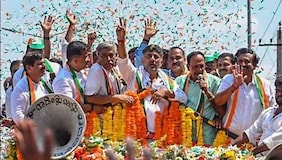Karnataka Election 2023: Why polls matter for BJP untangled in seven charts
Karnataka Election 2023: The political chessboard for the current electoral battle can only be understood in the context of what came before
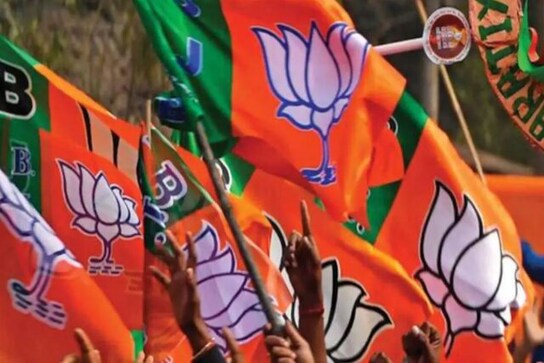
Representational image
The Karnataka assembly elections have turned into a high-stakes prestige contest for the BJP because of four reasons.
First, it is the only state in southern India where the party is in power.
Second, the party moves to a very different rhythm in Karnataka than how things work for it in north India. Political nuances in Karnataka are different from say in Uttar Pradesh or Gujarat. With defections mounting from the BJP’s old guard in Karnataka — including former chief minister Jagadish Shettar and former deputy chief minister Laxman Savadi — the poll battle also reflects the extent to which Karnataka’s politics marches to its tune, with local factors dominating.
Related Articles
Third, the stakes for the Congress are even higher in this state battle. The grand old party faces its own internal turf battles as well between supporters of DK Shivakumar and Siddaramaiah.
And finally, the outcome will be watched closely for what it could portend for the 2024 Lok Sabha elections.
Karnataka has historically been the BJP’s big outlier south of the Vindhyas.
Taken together, Karnataka, Tamil Nadu, Andhra Pradesh, Telangana, Kerala, and the union territory of Puducherry account for 130 Lok Sabha seats in southern India: over a fifth of the Lok Sabha’s 543 seats. In 2014, the BJP won only 16.1 per cent (twenty-one) of these seats overall in south India, and in 2019, 22.4 per cent (twenty-nine).
By contrast, in Karnataka, the BJP has consistently won a majority of parliamentary seats in four successive general elections between 2004 and 2019. Of Karnataka’s twenty-eight Lok Sabha seats, the BJP won eighteen in 2004, nineteen in 2009, seventeen in 2014, and twenty-five in 2019. It remains the only southern state where a saffron government has ever come to power.
Yet, it is important to remember that in contrast to its dominance in parliamentary elections in four successive polls in Karnataka (2004-19), the BJP has never managed to win a full majority in provincial elections in the state. It did, however, emerge as the single-largest party in 2004, 2008, and 2018.
The political chessboard for the current electoral battle can only be understood in the context of what came before.
Tables 1 and 2 showcase how the party grew in Karnataka and some key inflection points in its political trajectory in the state.
Table 1: The BJP in Karnataka: Vidhana Soudha Elections (1983-2019). Total seats, 224
1983: BJP’s first inroads- Janata: 95; Congress (I): 82; BJP: 18; Independents: 22
1985: BJP declines – Janata: 139; Congress: 65; BJP: 2; Independents: 13
1989: BJP support remains negligible- Congress: 178; JD: 24; BJP: 4; Independents: 12
1994: First BJP expansion, after Idgah Maidan agitation and Veerendra Patil sacking- JD: 115; BJP: 40; Congress: 34; KCP: 10; Independents: 18
1999: BJP consolidates- Congress: 132; BJP: 44; JD(U): 18, JD(S): 10; Independents: 19
2004: BJP becomes the single-largest party in a hung house, aligns with the JD(S). Both parties agree to have a CM each for twenty months. Yediyurappa becomes first BJP deputy CM—under JD(S) CM HD Kumaraswamy—and the first BJP CM in south India in 2007, but his government lasted only five days as JD(S) withdrew support. Seats tally- BJP: 79; Congress: 65; JD(S): 58
2008: BJP wins much bigger tally, forms its first full-term government in south India (though it did not win a simple majority, falling short of the halfway mark). Seats tally- BJP: 110; Congress: 80; JD(S): 28
2013: BJP declines substantially after Yediyurappa leaves the party and forms a new regional party that splits the BJP vote. Seats tally: Congress: 122; BJP: 40; JD(S): 40; KJP: 6; BSR Congress: 4
2018: BJP voted in as single-largest party, though short of simple majority. Forms government that fell in 2.5 days; JD(S)-Congress post-poll alliance takes power, but falls in 2019 after sixteen MLAs resign. Yediyurappa-led BJP formed government again in 2019. BJP appoints new CM, Basavaraj Bommai in July 2021. Seats tally- BJP: 104; Congress: 80; JD(S): 38; KPJP: 1; BSP: 1; Independent: 1
(Source: Election Commission, research and analysis by Nalin Mehta)
Table 2: The BJP in Karnataka: Lok Sabha Elections (1980-2019), Total seats 28
1980: No BJP wins, Congress dominant. Congress: 27; Janata Party: 1
1984: No BJP wins, Congress dominant. Congress: 24; Janata Party: 4
1989: No BJP wins, Congress dominant. Congress: 26; Janata Dal: 2
1991: First BJP breakthrough, a year after the Veerendra Patil sacking. Congress: 23, BJP: 4, Janata: 1
1996: Slight expansion by BJP, Janata replaces Congress as the leading party. Janata Dal: 16; BJP: 6; Congress: 5; KCP: 1
1998: The first time that the BJP wins a majority of Karnataka parliamentary seats, as part of the NDA alliance with Ramakrishna Hegde’s Lok Shakti formed in 1997 [after Hegde, a former Janata chief minister, is expelled from JD(S)]. NDA: 16 (BJP: 13 and Lok Shakti: 3); Congress: 9; Janata Dal: 3
1999: BJP declines. Congress: 18; BJP: 7; JD(S): 3
2004:人民党死灰复燃。人民党:18;国会:8;JD:2
2009: BJP dominance consolidated. BJP: 19; Congress: 6; JD(S): 3
2014: BJP dominance continues. BJP: 17; Congress: 9; JD(S): 2.
2019: BJP sweeps state. BJP: 26 (25 + support for 1 independent); Congress: 1; JD(S): 1
(Source: Election Commission, research and analysis by Nalin Mehta)
Crucially, the BJP’s spatial expansion in Karnataka follows a different pattern from that of the Congress. While the Congress’s support base is much more evenly distributed across the state, the BJP first grew in urban centres like Bengaluru, followed by the state’s coastal areas, and then in the northern parts.
Historically, the BJP’s vote base has been relatively more concentrated in specific areas, while the Congress’s is more evenly spread. This is one reason why Siddaramaiah’s government lost power in 2018, when it came in second to the BJP. Though the Congress won only 80 seats, compared to the BJP’s 104, its vote share of 38.14% was higher in that election than the BJP’s 36.35%. The saffron party’s greater spatial concentration of votes gave it the edge.
This trend becomes clearer when we study the BJP’s progress in Lok Sabha polls in Karnataka (see charts in Figure 3).
Figure 3: The BJP’s Spatial Expansion in Karnataka, (Lok Sabha Elections: 1991-2019)
1991: The BJP’s First Breakthrough
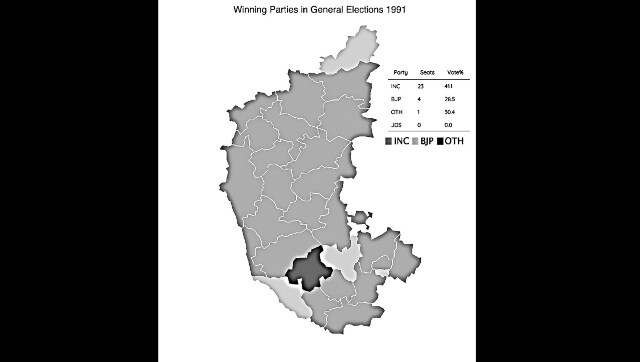
1996: A Slight Expansion
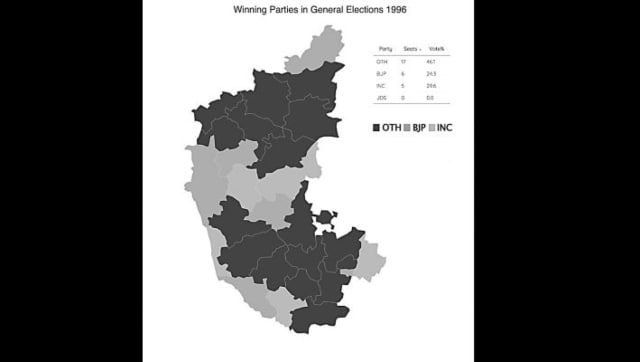
1998: First Time the BJP Wins a Majority of LS Seats
(alliance with Ramakrishna Hegde’s Lok Shakti)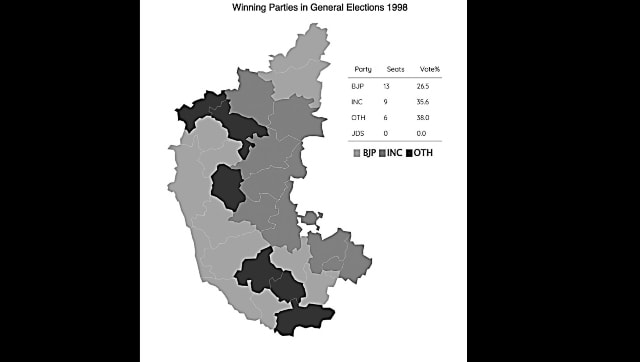
2004: BJP Begins New Phase of LS Dominance
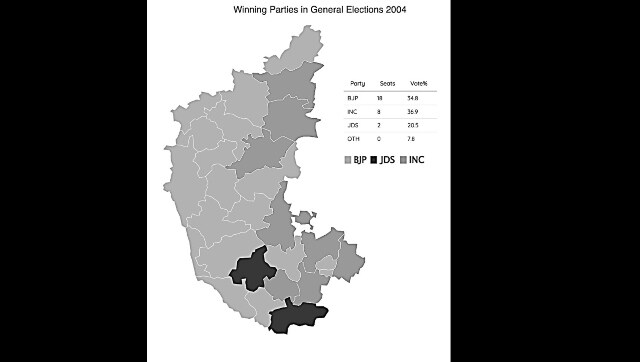
2009: The BJP Consolidates Dominance, a pattern that repeats in the 2014 and 2019 Lok Sabha Polls
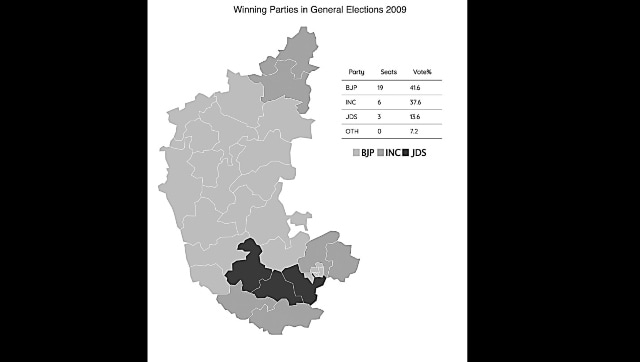
(Source: Election Commission data, spatially analysed and visualised by Nalin Mehta, Rishabh Srivastava on https://pollniti.com/#!)
These charts illustrate how voting patterns in Karnataka in state polls have often differed from those in national elections.
In that sense, the outcome of this needle contest in Karnataka will no doubt set much of the political discourse on the road to 2024. If the Congress wins, it will certainly lift up the opposition’s spirits. If the BJP manages to deny the Congress a comeback in Bengaluru, it will further the aura around the party’s electoral machine. But whatever the upshot of this contest, history indicates that it would be too premature to read the outcomes of Karnataka 2024 in the 2023 result.
This is the first of a 3-part series by Nalin Mehta on the Karnataka elections.
Nalin Mehta, an author and academic, is the Dean of School of Modern Media at UPES University in Dehradun, a Non-Resident Senior Fellow, Institute of South Asian Studies at the National University Singapore, and Group Consulting Editor, Network 18. He is the author of The New BJP: Modi and the Making of the World’s Largest Political Party. The views expressed in this article are those of the author and do not represent the stand of this publication.
Read all theLatest News,Trending News,Cricket News,Bollywood News,
India NewsandEntertainment Newshere. Follow us onFacebook,TwitterandInstagram.
also read

卡纳塔克邦2023年选举:超过3000名候选人fray after scrutiny; DK Shivakumar's nomination accepted
Of the 3,044 validly nominated candidates - 219 are from BJP, 218 Congress, 207 from JD(S), while the rest are all from small parties and Independents, according to the CEO's office

Karnataka Election 2023: Ajit Pawar missing from NCP list of star campaigners
Karnataka Election 2023: Speculation about NCP leader Ajit Pawar's next political move refuses to die down after the senior leader's name was missing from the NCP list of star campaigners for the Karnataka elections

Karnataka Election 2023: Amit Shah to take out rally in Devanahalli today, assess BJP preparations
Karnataka Election 2023: Union Home Minister and senior BJP leader Amit Shah will take out a roadshow in Karnataka's Devanahalli today as the saffron party gears up for the 10 May Assembly elections in the state


